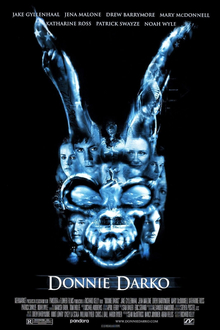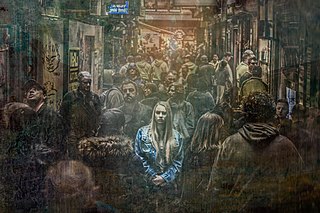Related Research Articles

Schizophrenia is a mental disorder characterized by reoccurring episodes of psychosis that are correlated with a general misperception of reality. Other common signs include hallucinations, delusions, disorganized thinking, social withdrawal, and flat affect. Symptoms develop gradually and typically begin during young adulthood and are never resolved. There is no objective diagnostic test; diagnosis is based on observed behavior, a psychiatric history that includes the person's reported experiences, and reports of others familiar with the person. For a diagnosis of schizophrenia, the described symptoms need to have been present for at least six months or one month. Many people with schizophrenia have other mental disorders, especially substance use disorders, depressive disorders, anxiety disorders, and obsessive–compulsive disorder.
Dissociative identity disorder (DID), also known as multiple personality disorder, split personality disorder, or dissociative personality disorder, is a member of the family of dissociative disorders classified by the DSM-5, DSM-5-TR, ICD-10, ICD-11, and Merck Manual for diagnosis. It remains a controversial diagnosis.

Donnie Darko is a 2001 American science fiction psychological thriller film written and directed by Richard Kelly and produced by Flower Films. It stars Jake Gyllenhaal, Jena Malone, Maggie Gyllenhaal, Drew Barrymore, Mary McDonnell, Katharine Ross, Patrick Swayze, Noah Wyle, Stu Stone, Daveigh Chase, and James Duval. Set in October 1988, the film follows Donnie Darko, an emotionally troubled teenager who inadvertently escapes a bizarre accident by sleepwalking. He has visions of Frank, a mysterious figure in a rabbit costume who informs him that the world will end in 28 days, 6 hours, 42 minutes and 12 seconds.

Borderline personality disorder (BPD), also known as emotionally unstable personality disorder (EUPD), is a personality disorder characterized by a pervasive, long-term pattern of significant interpersonal relationship instability, a distorted sense of self, and intense emotional responses. Individuals diagnosed with BPD frequently exhibit self-harming behaviours and engage in risky activities, primarily due to challenges in regulating emotional states to a healthy, stable baseline. Symptoms such as dissociation, a pervasive sense of emptiness, and an acute fear of abandonment are prevalent among those affected.

Schizoid personality disorder is a personality disorder characterized by a lack of interest in social relationships, a tendency toward a solitary or sheltered lifestyle, secretiveness, emotional coldness, detachment, and apathy. Affected individuals may be unable to form intimate attachments to others and simultaneously possess a rich and elaborate but exclusively internal fantasy world. Other associated features include stilted speech, a lack of deriving enjoyment from most activities, feeling as though one is an "observer" rather than a participant in life, an inability to tolerate emotional expectations of others, apparent indifference when praised or criticized, a degree of asexuality, and idiosyncratic moral or political beliefs.

Avoidant personality disorder (AvPD) or Anxious personality disorder is a Cluster C personality disorder characterized by excessive social anxiety and inhibition, fear of intimacy, severe feelings of inadequacy and inferiority, and an overreliance on avoidance of feared stimuli as a maladaptive coping method. Those affected typically display a pattern of extreme sensitivity to negative evaluation and rejection, a belief that one is socially inept or personally unappealing to others, and avoidance of social interaction despite a strong desire for it. It appears to affect an approximately equal number of men and women.

A mood swing is an extreme or sudden change of mood. Such changes can play a positive part in promoting problem solving and in producing flexible forward planning, or be disruptive. When mood swings are severe, they may be categorized as part of a mental illness, such as bipolar disorder, where erratic and disruptive mood swings are a defining feature.

Jacob Benjamin Gyllenhaal is an American actor. Born into the Gyllenhaal family, he is the son of director Stephen Gyllenhaal and screenwriter Naomi Foner, and the younger brother of actress Maggie Gyllenhaal. He began acting as a child, making his acting debut in City Slickers (1991), followed by roles in his father's films A Dangerous Woman (1993) and Homegrown (1998). His breakthrough roles were as Homer Hickam in October Sky (1999) and as a psychologically troubled teenager in Donnie Darko (2001).
Schizotypal personality disorder, also known as schizotypal disorder, is a cluster A personality disorder. The Diagnostic and Statistical Manual of Mental Disorders (DSM) classification describes the disorder specifically as a personality disorder characterized by thought disorder, paranoia, a characteristic form of social anxiety, derealization, transient psychosis, and unconventional beliefs. People with this disorder feel pronounced discomfort in forming and maintaining social connections with other people, primarily due to the belief that other people harbor negative thoughts and views about them. Peculiar speech mannerisms and socially unexpected modes of dress are also characteristic. Schizotypal people may react oddly in conversations, not respond, or talk to themselves. They frequently interpret situations as being strange or having unusual meanings for them; paranormal and superstitious beliefs are common. Schizotypal people usually disagree with the suggestion that their thoughts and behaviors are a 'disorder' and seek medical attention for depression or anxiety instead. Schizotypal personality disorder occurs in approximately 3% of the general population and is more commonly diagnosed in males.

Panphobia, omniphobia, pantophobia, or panophobia is a vague and persistent dread of some unknown evil. Panphobia is not registered as a type of phobia in medical references.
In psychology, schizotypy is a theoretical concept that posits a continuum of personality characteristics and experiences, ranging from normal dissociative, imaginative states to extreme states of mind related to psychosis, especially schizophrenia. The continuum of personality proposed in schizotypy is in contrast to a categorical view of psychosis, wherein psychosis is considered a particular state of mind, which the person either has or does not have.
Paranoid personality disorder (PPD) is a mental disorder characterized by paranoia, and a pervasive, long-standing suspiciousness and generalized mistrust of others. People with this personality disorder may be hypersensitive, easily insulted, and habitually relate to the world by vigilant scanning of the environment for clues or suggestions that may validate their fears or biases. They are eager observers and they often think they are in danger and look for signs and threats of that danger, potentially not appreciating other interpretations or evidence.
Works of fiction dealing with mental illness include:

Manichitrathazhu is a 1993 Indian Malayalam-language epic psychological horror film directed by Fazil, written by Madhu Muttam, and produced by Swargachitra Appachan. The film stars Mohanlal, Suresh Gopi and Shobana in addition to Nedumudi Venu, Innocent, Vinaya Prasad, K.P.A.C.Lalitha, Sridhar, K.B. Ganesh Kumar, Sudheesh, Thilakan and others in supporting roles. The story is inspired by a tragedy that happened in an Ezhava tharavad, the Alummoottil meda, located at Muttom, belonging to a central Travancore Channar family, in the 19th century. The writer of the film, Madhu K Panicker or Madhu Muttam, is a member of the Alummoottil Tharavad.
Michael Terrence McGuire was an American psychiatrist who made contributions to the theory of psychoanalysis, biological psychiatry, evolutionary biology, sociobiology and the theory and practice of psychiatry.
Personality disorders (PD) are a class of mental disorders characterized by enduring maladaptive patterns of behavior, cognition, and inner experience, exhibited across many contexts and deviating from those accepted by the individual's culture. These patterns develop early, are inflexible, and are associated with significant distress or disability. The definitions vary by source and remain a matter of controversy. Official criteria for diagnosing personality disorders are listed in the sixth chapter of the International Classification of Diseases (ICD) and in the American Psychiatric Association's Diagnostic and Statistical Manual of Mental Disorders (DSM).
The mainstay of management of borderline personality disorder is various forms of psychotherapy with medications being found to be of little use.
Pseudoneurotic schizophrenia is a postulated mental disorder categorized by the presence of two or more symptoms of mental illness such as anxiety, hysteria, and phobic or obsessive-compulsive neuroses. It is often acknowledged as a personality disorder. Patients generally display salient anxiety symptoms that disguise an underlying psychotic disorder.
Mental illnesses, also known as psychiatric disorders, are often inaccurately portrayed in the media. Films, television programs, books, magazines, and news programs often stereotype the mentally ill as being violent, unpredictable, or dangerous, unlike the great majority of those who experience mental illness. As media is often the primary way people are exposed to mental illnesses, when portrayals are inaccurate, they further perpetuate stereotypes, stigma, and discriminatory behavior. When the public stigmatizes the mentally ill, people with mental illnesses become less likely to seek treatment or support for fear of being judged or rejected by the public. However, with proper support, not only are most of those with psychiatric disorders able to function adequately in society, but many are able to work successfully and make substantial contributions to society.
John Gunder Gunderson was a professor of psychiatry at Harvard University and a director at the Borderline center at McLean Hospital.
References
- Danny Wedding, Mary Ann Boyd and Ryan M. Niemiec, Movies and Mental Illness: Using Films to Understand Psychopathology, 2nd ed., Cambridge, MA, Hogrefe & Hufer Publishing, 2005, ISBN 0-88937-292-6. Movies and Mental Illness – Hogrefe Publishing
- David J. Robinson, Reel Psychiatry: Movie Portrayals of Psychiatric Conditions, Rapid Psychler Press, 2003, ISBN 1-894328-07-8.
- Glen O. Gabbard and Krin Gabbard, Psychiatry and the Cinema, American Psychiatric Publishing, Inc., 2nd ed., 1999, ISBN 0-88048-964-2.
- Otto F. Wahl, Media Madness: Public Images of Mental Illness, Piscataway, NJ, Rutgers University Press, 1997, ISBN 0-8135-2213-7.